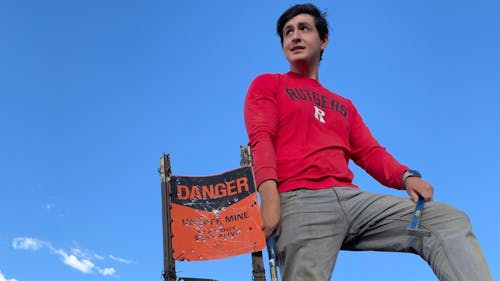Rutgers student selected for US Department of Defense fellowship, emphasizes passion in research

David Tibbits, a graduate student and teaching assistant in the Department of Earth and Planetary Sciences, was recently selected as a fellow for the United States Department of Defense (DoD) National Defense Science and Engineering Fellowship program, according to a press release.
American citizens and residents can apply to the National Defense Science and Engineering Fellowship program to pursue doctoral degrees that match the DoD's Broad Agency Announcements in research, according to the program website.
In an interview with The Daily Targum, Tibbits discussed his work in various roles at Rutgers and explained how he leveraged resources at the University into his application for the program.
Tibbits works as a lab manager for the Rutgers/New Jersey Geological and Water Survey Core Repository, where he spends most of his time running his lab sessions and mentoring 15 undergraduate students from the department and conducting various small-scale projects with Repository's core-scanning X-ray fluorescence device (XRF).
Tibbits said he is currently collaborating on the Newark Basin Coring Project, which involves using the XRF, a non-destructive analytical method for figuring out a material's elemental composition, to interpret climate changes during the Triassic period by analyzing sedimentary rocks from that time.
Through the Repository, he is also studying uranium and arsenic concentrations in the Colorado Plateau near the Navajo Nation in Northern Arizona. He and his team are using the cores in the region to attempt to locate the contaminants in the ground.
Despite the size of his projects, Tibbits said he truly enjoyed all the work he and his students have done. He also demonstrated his appreciation for the energy his students have brought to the program.
"We're pretty lucky that our department has lots of students that are quite passionate about the subject," he said.
Tibbits said he was less concerned with the monetary support offered through the program, as he was able to obtain similar funding through the University, and more drawn to the program for the opportunity to pursue research in a way he had not previously explored. He referred to research and passion as two key parts of the application process.
Regarding the former, Tibbits said he was required to submit a proposal detailing the research he sought to pursue as a graduate student in order to be considered. His area of research in this program will be to characterize abandoned mine land features in Northeast Pennsylvania.
These coal mines may contain various rare earth elements that could potentially be retrieved and produce toxic runoff due to interactions between water and certain minerals in the region. Tibbits said there is very limited financial support to investigate a solution.
Regarding the latter, he said those who want to apply to the fellowship have to show as much fervor for the topic as they can. Tibbits, for example, used an image of resources he had collected at a mine as his Zoom background while speaking to the Targum as a testament to what geology means to him.
"I think the thing that sets people apart in every form of application," he said. "Whether it be fellowship, or application for a job or college, is if you can show not only you can do what you say to do, but you love to do it, that you are passionate about it."



